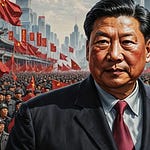Is there a mysterious Factor X that can speed growth, enhance opportunity, raise wages, & convince others that no, China does not have a superior system?
RSS URL: <https://api.substack.com/feed/podcast/47874.rss>
Works Referenced:
Twirlip of the Mists: Hexapodia as the Key Insight: ‘I haven't had a chance to see the famous video from Straumli Realm, except as an evocation. (My only gateway onto the Net is very expensive.) Is it true that humans have six legs? I wasn't sure from the evocation. If these humans have three pairs of legs, then I think there is an easy explanation…<http://web.hexapodia.org/>
Vernor Vinge: A Fire Upon the Deep: ‘Blueshell: “All right, one quest. But never another!”… <https://www.amazon.com/Fire-Upon-Deep-Zones-Thought-ebook/dp/B000FBJAGO>
Noah Smith: Don’t Give Up on Bringing Manufacturing Back to the U.S.: ‘Offering Americans a concrete vision of what their economy could look like… may be able to gather broad support for a cohesive growth strategy, even if it isn’t a perfect one. The U.S. economic strategy of leaving industrial policy to the whims of the market has hit the point of severely diminishing returns… <https://www.bloomberg.com/opinion/articles/2020-06-12/don-t-give-up-on-bringing-manufacturing-back-to-the-u-s?sref=R8NfLgwS>
Joe Studwell: How Asia Works: Success and Failure In the World's Most Dynamic Region: ‘What created the Canons, the Samsungs, the Acers… was the marriage of infant industry protection and market forces, involving (initially) subsidised exports and competition between manufacturers that vied for state support… <https://books.google.com/books?id=dNs33Q1cAX0C>
Michael Porter & al.: Can Japan Compete?: ’If Japanese government policies and practices accounted for the nation's extraordinary competitiveness, then why wasn't Japan competitive in many of the industries where those policies had been prominently implemented?… <https://books.google.com/books?id=QYSwwQEACAAJ>
Albert Hirschman: The Strategy of Economic Development: ‘The strategic nature of development should lead to the coordination of economic and political forces and decision makers in a consensual path… fostering a common vision or a project of society that an expert might help make visible and publicly debated… <https://books.google.com/books?id=foREAAAAYAAJ>
Henry Farrell: In Praise of Negativity: ‘Mercier and Sperber’s basic argument is… that reasoning,,,has evolved as a social capacity—as a means to justify ourselves to others…. We need negative criticisms from others, since they lead us to understand weaknesses in our arguments that we are incapable of coming at ourselves… <https://crookedtimber.org/2020/07/24/in-praise-of-negativity/>
Chalmers Johnson: MITI & the Japanese Miracle: The Growth of Industrial Policy 1925-1975: ‘I wanted to call attention to the differences… between the capitalist economies of the United States and Britain… and Japan and its emulators… <https://books.google.com/books?id=bbGlwsjW-ekC>
Henry Farrell & Abraham Newman: Weaponized Interdependence: How Global Economic Networks Shape State Coercion: ‘The ability of a state to weaponize interdependence is dependent upon its institutions, the size of its economy, and how much autonomy the state has from that interconnectedness (whether or not it has asymmetrical interdependence)… <https://www.dropbox.com/s/cbv95thldv2dzro/%20Post%20Proofreading%20Weaponized%20Interdependence_IS_Submission.docx?dl=0>
Stephen Cohen & J. Bradford DeLong: Concrete Economics: The Hamilton Approach to Economic Growth: ‘Since Hamilton America’s successful economic policy has been pragmatic, not ideological; concrete, not abstract… <https://books.google.com/books?id=BXoyBgAAQBAJ>
Charles Schultze: Industrial Policy: A Dissent: ‘America is not de-industrializing. Japan does rlot owe its industrial success to its industrial policy. Government is not atble to devise a "winning" industrial structure. Finally, it is not possible in the American political system to pick and choose among individual firms and regions in the substantive, efficiency-driven way envisaged by advocates of industrial policy… <https://www.brookings.edu/wp-content/uploads/2016/06/industrial_policy_schultze.pdf>
















Share this post